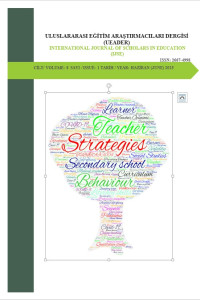Abstract
Disruptive Innovative Transformation (DIT) is reshaping economic education by integrating technological advancements and new pedagogical models. This study examines the impact of DIT on economic literacy and workforce preparedness, emphasizing the shift from traditional teaching methods to digital learning ecosystems. The research adopts a qualitative approach, analysing previous studies and literature on digital transformation in education. Findings indicate that digital platforms, MOOCs and personalized driven learning, enhance accessibility and engagement. However, challenges remain, including digital inequality and the need for teacher training. The study suggests that integrating innovative economic education strategies, supported by policy reforms and industry collaboration, can enhance students’ adaptability to evolving economic landscapes. The implications highlight the necessity for a flexible curriculum that aligns with technological and economic shifts.
References
- Ahmad, S. A., Yoke, S. K., Yunos, R. M., & Amin, J. M. (2020). Exploring Lecturers’ Readiness for 21st Century Education in Malaysian Higher Learning Institutions. European Journal of Teaching and Education, 1(1), 15–29. https://doi.org/10.33422/EJTE.2019.10.27
- Babbar, M., & Gupta, T. (2022). Response of educational institutions to COVID-19 pandemic: An inter-country comparison. Policy Futures in Education, 20(4), 469-491. https://doi.org/10.1177/14782103211021937
- Birdi, A., Cook, S., Elliott, C., Lait, A., Mehari, T., & Wood, M. (2023). A critical review of recent economics pedagogy literature, 2020–2021. International Review of Economics Education, 43, 100264. https://doi.org/10.1016/j.iree.2023.100264
- Bucea-Manea-Țoniş, R., Martins, O. M. D., Bucea-Manea-Țoniş, R., Gheorghiță, C., Kuleto, V., Ilić, M. P., & Simion, V.-E. (2021). Blockchain Technology Enhances Sustainable Higher Education. Sustainability, 13(22), 12347. https://doi.org/10.3390/su132212347
- Christensen, C. M. (1997). The Innovator’s Dilemma: When New Technologies Cause Great Firms to Fail. Harvard Business Review Press.
- Cohen, A. J. (2023). What do we want students to (know and) be able to do: Learning outcomes, competencies, and content in literacy-targeted principles courses. The Journal of Economic Education, 55(2), 128–145. https://doi.org/10.1080/00220485.2023.2282016
- EENEE. (2023). The latest research trends in the field of economics of education: July-December 2023. EENEE report. https://eenee.eu/wp-content/uploads/2024/01/Annex-1_Research-trends.pdf
- Frigotto, M.L., Young, M., & Pinheiro, R. (2022). Resilience in Organizations and Societies: The State of the Art and Three Organizing Principles for Moving Forward. In: Pinheiro, R., Frigotto, M.L., Young, M. (eds) Towards Resilient Organizations and Societies. Public Sector Organizations. Palgrave Macmillan, Cham. https://doi.org/10.1007/978-3-030-82072-5_1
- Goffe, W. L., & Wolla, S. A. (2023). Cognitive science teaching strategies and literacy-targeted economics complementarities. The Journal of Economic Education, 55(2), 156–165. https://doi.org/10.1080/00220485.2023.2295284
- Goffe, W. L. (2024). Educational technology for teaching economics–Where to start and how to grow? The Journal of Economic Education, 55(1), 77–84. https://doi.org/10.1080/00220485.2023.2274026
- Grol, R., Sent, E. M., & de Vries, B. (2017). Participate or observe? Effects of economic classroom experiments on students’ economic literacy. European Journal of Psychology of Education, 32, 289-310. https://doi.org/10.1007/s10212-016-0287-8
- Johnson, M., & Meder, M. E. (2024). Twenty-three years of teaching economics with technology. International Review of Economics Education, 45, 100279–100279. https://doi.org/10.1016/j.iree.2023.100279
- Maier, M., & Ruder, P. (2024). Assessment to promote learning in a literacy-targeted (LT) economics course. The Journal of Economic Education, 55(2), 146–155. https://doi.org/10.1080/00220485.2023.2285451
- Morawska-Jancelewicz, J. (2021). The Role of Universities in Social Innovation Within Quadruple/Quintuple Helix Model: Practical Implications from Polish Experience. Journal of the Knowledge Economy, 13(3), 2230-2271. https://doi.org/10.1007/s13132-021-00804-y
- Nanda, N., None Wahyu, & None Riya Rahmadani. (2024). Economic Literacy and Human Development through Technology-Based Economic Education for Generation Z Students. Journal of Economic Education and Entrepreneurship Studies, 5(4), 656–671. https://doi.org/10.62794/je3s.v5i4.4392
- Oke, A., & Fernandes, F. A. P. (2020). Innovations in Teaching and Learning: Exploring the Perceptions of the Education Sector on the 4th Industrial Revolution (4IR). Journal of Open Innovation: Technology, Market, and Complexity, 6(2), 31. https://doi.org/10.3390/joitmc6020031
- Pang, C., & Wang, Q. (2024). How Digital Transformation Promotes Disruptive Innovation? Evidence from Chinese Entrepreneurial Firms. Journal of the Knowledge Economy, 15(2), 7788–7818. https://doi.org/10.1007/s13132-023-01413-7
- Paşa, A. T. (2020). Economic education in the digital era. Proceedings of the International Conference on Business Excellence, 14(1), 434–444. https://doi.org/10.2478/picbe-2020-0041
- Pokhrel, S., & Chhetri, R. (2021). A Literature Review on Impact of COVID-19 Pandemic on Teaching and Learning. Higher Education for the Future, 8(1), 133-141. https://doi.org/10.1177/2347631120983481
- Pühringer, S., & Bäuerle, L. (2019). What economics education is missing: the real world. International Journal of Social Economics, 46(8), 977–991. https://doi.org/10.1108/ijse-04-2018-0221
- Rajumesh, S. (2023). Promoting sustainable and human-centric industry 5.0: a thematic analysis of emerging research topics and opportunities. Journal of Business and Socio-Economic Development, 4(2), 111-126. https://doi.org/10.1108/jbsed-10-2022-0116
- Secundo, G., Rippa, P., & Cerchione, R. (2020). Digital Academic Entrepreneurship: A structured literature review and avenue for a research agenda. Technological Forecasting and Social Change, 157, 120118. https://doi.org/10.1016/j.techfore.2020.120118
- Terentev, E., Shcheglova, I., Federiakin, D., Koreshnikova, Y., & Costley, J. (2024). Active versus Passive Teaching: Students’ Perceptions and Thinking Skills. Voprosy Obrazovaniya / Educational Studies Moscow, 1(3). https://doi.org/10.17323/vo-2024-16364
- Tiwari, C., Gopalakrishnan, S., Kaur, D., & Pal, A. (2020). Promoting Financial Literacy through Digital Platforms: A Systematic Review of Literature and Future Research Agenda. Journal of General Management Research, 7(2), 15–26.
- Turnbull, D., Chugh, R., & Luck, J. (2021). Transitioning to E-Learning during the COVID-19 pandemic: How have Higher Education Institutions responded to the challenge?. Education and Information Technologies, 26(5), 6401-6419. https://doi.org/10.1007/s10639-021-10633-w
- Varcoe, K. P., & Fitch, P. R. (2003). Money talks - a program to improve financial literacy of teens. International Journal of Consumer Studies, 27(3), 225–226. https://doi.org/10.1046/j.1470-6431.2003.00308_11.x
- Wunder, T. A., Kemp, T., & England, S. (2009). Fact-Based Economic Education. Journal of Economic Issues, 43(2), 467–475. https://doi.org/10.2307/25511450
Details
| Primary Language | English |
|---|---|
| Subjects | Curriculum Development in Education, Program Design, Instructional Technologies |
| Journal Section | Articles |
| Authors | |
| Early Pub Date | July 1, 2025 |
| Publication Date | June 30, 2025 |
| Submission Date | February 20, 2025 |
| Acceptance Date | June 30, 2025 |
| Published in Issue | Year 2025 Volume: 8 Issue: 1 |
|
| |




